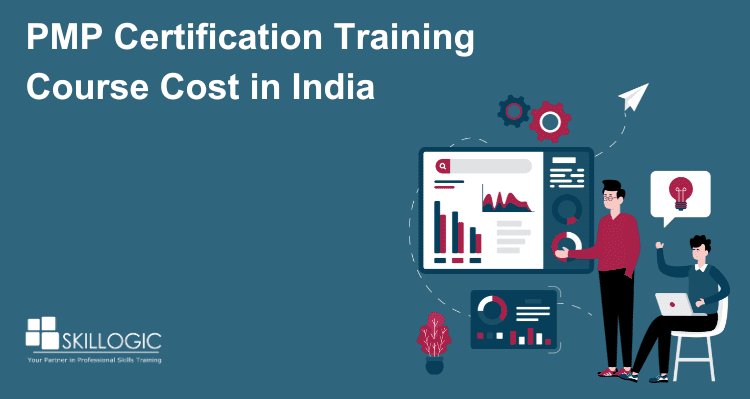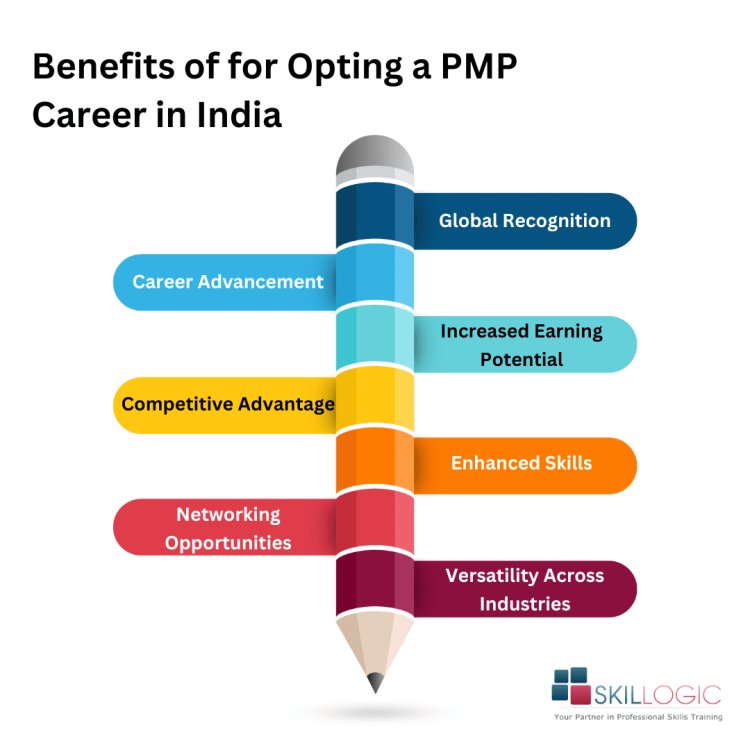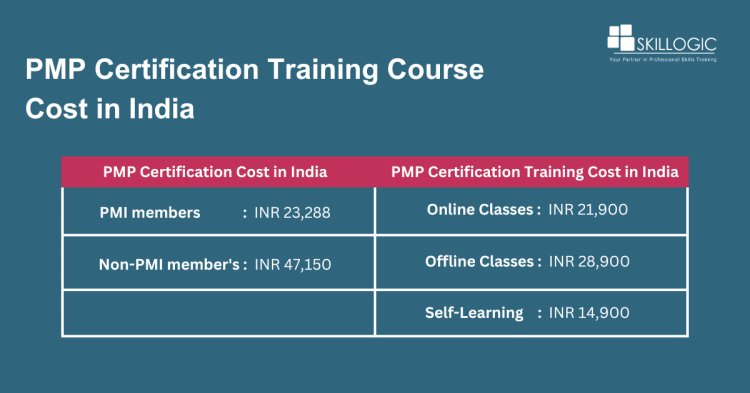PMP Certification Training Course Cost in India
The PMP Certification Training Course in India offers professional project management training to help individuals pass the PMP exam. Costs vary depending on the provider, course format, and location, making it essential to research options for the best value.

The Project Management Professional (PMP) certification is universally acknowledged as a prestigious accreditation signifying expertise in project management on a global scale. For professionals looking to enhance their career prospects in India, obtaining PMP certification is often a strategic move. However, one crucial aspect to consider before embarking on this journey is the cost associated with PMP certification training courses.
According to a report from Verified Market Research, the Project Management Software market reached a value of $6.06 billion in 2022 and is expected to reach $13.46 billion by 2030. This growth is forecasted to occur at a Compound Annual Growth Rate (CAGR) of 10.5% from 2023 to 2030. In this comprehensive guide, we will delve into the step-by-step breakdown of the costs involved in pursuing PMP certification training in India.
Describing Project Management: A Comprehensive Guide
Project management is a discipline that has witnessed a surge in popularity and advancement in recent years, becoming an indispensable component across various industries. Its rise can be attributed to the increasingly complex nature of projects, driven by globalization, technological advancements, and evolving business landscapes.
As per a recent study conducted by Grand View Research, Inc., it is forecasted that the global project management software market will attain an estimated value of approximately $20.47 billion by the year 2030. This anticipated expansion is expected to occur at a compounded annual growth rate (CAGR) of around 15.7% from 2023 to 2030. Moreover, the advent of sophisticated project management methodologies, tools, and software has revolutionized the field, enabling better collaboration, risk management, and decision-making.
Read these articles:
What is PMI?
PMI stands for Project Management Institute. It is a global professional organization dedicated to advancing the project management profession. PMI offers various certifications, including the Project Management Professional (PMP) certification, which is widely recognized and respected in the field of project management. The institute provides resources, training, and networking opportunities for project managers and professionals involved in project management. Additionally, PMI publishes standards, guidelines, and frameworks related to project management practices.
Defining PMP
PMP stands for Project Management Professional. The Project Management Professional (PMP) certification, provided by the Project Management Institute (PMI), is widely acknowledged as a professional accreditation recognized internationally. The PMP certification demonstrates a project manager's competency in leading and directing project teams. To earn the PMP certification, candidates must meet certain education and experience requirements, pass a rigorous examination, and adhere to a code of professional conduct. PMP certification is highly regarded in the field of project management and can enhance career opportunities and earning potential for professionals in this field.
Understanding PMP Certification:
Before delving into the costs, it's essential to understand what PMP certification entails. Offered by the Project Management Institute (PMI), PMP certification demonstrates an individual's proficiency in project management processes, knowledge areas, and best practices. It requires passing a rigorous exam and fulfilling specific educational and professional experience criteria.
Refer to this article: Why PMP Certification is required anyway?
Key Role in Project Management Professional (PMP) Domains
In the realm of Project Management Professional (PMP), several key roles contribute to the success and efficacy of projects. These roles encompass a range of responsibilities and expertise, ensuring that projects are planned, executed, and completed efficiently. Here are the crucial players in the PMP field:
Project Manager: The central figure responsible for overseeing the entire project lifecycle, from initiation to closure. Project managers coordinate resources, manage stakeholders, mitigate risks, and ensure that project objectives are achieved within scope, time, and budget constraints.
Project Team Members: These individuals execute tasks and activities according to the project plan under the guidance of the project manager. They bring specialized skills and knowledge to accomplish project deliverables and contribute to achieving project goals.
Stakeholders: Individuals or groups with an interest or concern in the project's outcome. Stakeholders may include clients, sponsors, end-users, regulatory bodies, and anyone affected by the project. Effective stakeholder management is essential for aligning expectations, obtaining support, and managing communications throughout the project lifecycle.
Project Sponsor: A senior-level individual or group responsible for championing the project and providing financial resources, strategic direction, and high-level support. Project sponsors play a crucial role in securing organizational buy-in, resolving conflicts, and removing obstacles to project success.
Subject Matter Experts (SMEs): Experts in specific domains or areas relevant to the project who provide specialized knowledge, guidance, and support. SMEs contribute insights during project planning, execution, and evaluation, ensuring that project activities align with industry best practices and standards.
Functional Managers: Managers responsible for overseeing specific departments or functional areas within the organization. Functional managers allocate resources, assign personnel, and provide support to project teams while ensuring that departmental objectives are met.
Project Management Office (PMO): A centralized unit within the organization responsible for standardizing project management processes, methodologies, and practices. The PMO provides support, governance, and oversight to project managers and teams, ensuring consistency and alignment with organizational goals.

Benefits of for Opting a PMP Career in India
Opting for a Project Management Professional (PMP) Career in India can offer several benefits:
- Global Recognition: PMP certification is globally recognized and respected, indicating a high level of competence and expertise in project management practices. This recognition can enhance your career prospects not only in India but also internationally.
- Career Advancement: PMP certification can open doors to higher-level job opportunities and career advancement. Many companies in India seek PMP-certified professionals for managerial and leadership roles, offering better salaries and benefits.
- Increased Earning Potential: PMP certification often leads to higher salaries compared to non-certified project managers. In India, where skilled project managers are in demand, PMP certification can significantly increase your earning potential.
- Competitive Advantage: With the growing competition in the job market, having PMP certification gives you a competitive edge over other candidates. It demonstrates your commitment to professional development and proficiency in project management methodologies.
- Enhanced Skills: The process of obtaining PMP certification involves rigorous study and examination, which equips you with advanced project management skills and knowledge. These skills are valuable not only for your current role but also for future career growth.
- Networking Opportunities: Becoming a PMP provides opportunities to connect with other professionals in the field through PMI (Project Management Institute) chapters, forums, and events. Networking can help you stay updated on industry trends, job opportunities, and best practices.
- Versatility Across Industries: Project management skills are applicable across various industries, including IT, construction, healthcare, finance, and manufacturing. PMP certification offers versatility, allowing you to work in different sectors and adapt to changing industry demands.

PMP Certification Training Course Cost in India
The Project Management Professional Certification (PMP) Cost in India may fluctuate based on whether an individual holds a membership with the Project Management Institute (PMI). The PMP exam fee in India is required to take the Project Management Professional certification exam.
- For PMI members it is INR 23,288
- Non-PMI member's cost is INR 47,150.
Read this article: PMP® or PRINCE2®: Key differences
PMP Certification Classes Cost in India
Generally, the PMP certification training cost in India ranges from INR 20,000 to INR 50,000. Aspirants looking for PMP courses can join the SKILLOGIC Institute.
SKILLOGIC is India's preferred institute for professional certification training and offers PMP certification classes at varying costs depending on the mode of instruction. Skillogic stands out as a trusted provider, ensuring comprehensive and effective training for PMP certification in India.
Online Classes:
Online PMP certification training cost in India is available for INR 21,900. For instance, Online courses are suitable for candidates who need flexibility due to work or other commitments. They offer self-paced programs with both live and pre-recorded classes.
Offline Classes:
The Offline PMP certification training cost in India is around INR 28,900. These offline classes boast a high success rate, contingent on the quality of interactive sessions and guidance provided.
Self-Learning:
The self-learning certification training cost in India ranges from INR 14,900 per year. This option provides flexibility for individuals to pace their learning according to their schedule and preferences, making it an affordable and convenient choice for aspiring professionals.

Factors Affecting Course Cost:
- Training Provider: Different training providers offer PMP certification courses at varying price points. Established institutes or those endorsed by PMI might charge higher fees due to their reputation and quality of instruction.
- Course Format: Online PMP courses in India are often more affordable than in-person ones due to reduced overhead costs. However, some professionals prefer the structure and interaction offered by in-person classes.
- Duration: Shorter duration courses might be more cost-effective but could be intensive. Longer duration courses might provide a more comprehensive understanding but at a higher cost.
- Additional Resources: Some courses include supplementary materials such as practice exams, study guides, and access to online forums, which can influence the overall cost.
Earning the PMP certification can open up lucrative job opportunities across various industries such as IT, manufacturing, finance, and healthcare. The Project Management Institute (PMI) is the governing body behind the PMP certification, and they have developed the Project Management Body of Knowledge (PMBOK) guide, which serves as the foundation for the PMP exam. Given the comprehensive nature of the PMP exam, it's essential to choose a reputable training institute to adequately prepare. Many professionals find the exam challenging due to its extensive coverage of topics. Thus, supplementing with additional reading materials can be beneficial for candidates aiming to succeed in the PMP exam.
Prospective candidates can choose to enroll in SKILLOGIC Training Institute, a renowned global training provider that offers specialized certification programs in areas such as Project Management, Quality Management, Cyber Security, Software Development, and Business Analytics. With a track record of over ten years, SKILLOGIC® has emerged as a frontrunner in the industry, serving a broad international student community of over 100+ learners. Their comprehensive selection encompasses more than 25 accreditations and partnerships, backed by a committed team of over 100 seasoned instructors.
SKILLOGIC is a leading global provider of professional training, offering expert-led PMP certification courses that enhance project management skills and help individuals remain competitive in the ever-evolving business landscape.

0
349